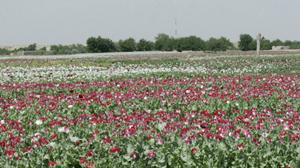KABUL - Afghan officials today vowed to eradicate the country’s drug trade and drug-funded terrorism as they thanked the international community, including the United Nations, for helping out in the country’s counter-narcotics campaign.
The joint campaign has so far reduced the number of Afghans involved in opium poppy cultivation by 28 per cent from 2007 to 2008, according to the World Drug Report 2009, which was launched on Wednesday by the United Nations Office on Drugs and Crime (UNODC) in Washington DC.
International Day against Drug Abuse and Illicit Trafficking is marked every year on 26 June.
In a ceremony marking the day at the Amani High School in Kabul, Afghanistan’s second Vice-President, Mohammad Karim Khalili, warned about the “international consequences” of the Afghan drug trade, which, he said, is the main source of funds of terrorists.
“Terrorism is yet another challenge that Afghanistan is facing. It is, in fact, the biggest challenge and even has international consequences,” added Mr Khalili who called on his countrymen to help “collapse the financial resources” of the drug-financed terrorists.
Dubbing drug cultivation, drug use and its trafficking as a “cursed phenomena - a destructive phenomena that is destroying all our Afghan honour and values,” the Afghan Vice President stressed that Afghanistan “needs the support from all countries in the region” in its joint counter-narcotics campaign with international donors.
A staggering 93 per cent of the world’s opium is grown in Afghanistan, according to the new report, which, however, noted a positive development – “opium cultivation in Afghanistan…declined by 19 per cent in 2008.”
“The report noted the decline of global opium poppy cultivation to 189,000 hectares in 2008, largely as a result of a decrease in Afghanistan’s cultivation area,” reads a press release from the agency.
For his part, General Khodaidad, the Minister of Counter Narcotics, stressed, “there is no place for drugs in our life,” as he cited the slogan of World Drug Day 2009 – “Do drugs control your life?”
“All drug-related activities, all drug-financed activities, threaten the government of Afghanistan because they are financing the enemies of Afghanistan,” he pointed out.
More than 5,000 hectares of land have been cleared of narcotics plants, according to General Khodaidad, noting the government’s anti-narcotics campaign was “helped by a lot of foreign countries like the UK, the United States, and the European Union countries.”
General Daoud Daoud, the Deputy Minister for Counter-Narcotics, thanked the United States and NATO for helping out in big operations against drug traders, enabling the government to seize 100 tons of drugs this month.
General Daoud said the Government of Afghanistan is also working closely with the Governments of Iran and Pakistan to help stop the import of chemical substances, which are used in the manufacture of drugs.
The anti-narcotics official also asked the international community to help wean away farmers from drug cultivation by providing subsidy programmes and low-priced fertilizers.
Deputy Minister of Women’s Affairs, Sayeda Muzhgan, reported during the Amani High School event that of the drug users “introduced to treatment” in the country’s drug-rehabilitation centers, one-third are women.
At the same event, Michael Hartmann, UNODC’s Officer-in-Charge in Afghanistan, congratulated the Government of Afghanistan “on reducing opium cultivation,” adding ”we hope that this trend will continue in 2009.”
“Cultivating opium remains central to some agricultural communities in Afghanistan, and many Afghans continue to generate their main income from growing an illicit drug, albeit down to 2.4 million from 2007’s 3.3 million,” added Mr Hartmann.
Mr Hartmann reaffirmed UNODC’s commitment to support the Afghan government and to work together “with the shared vision of an Afghanistan free from the critical threat of the drug trade.”
“The increased availability of heroin has changed drug use patterns in Afghanistan and neighboring countries, from traditional opium smoking and oral consumption to drug injection,” according to the agency, whose country team has observed that “a significant number of Afghanistan’s injecting drug users are returnees from neighboring countries.”
By Aurora Alambra, UNAMA.






